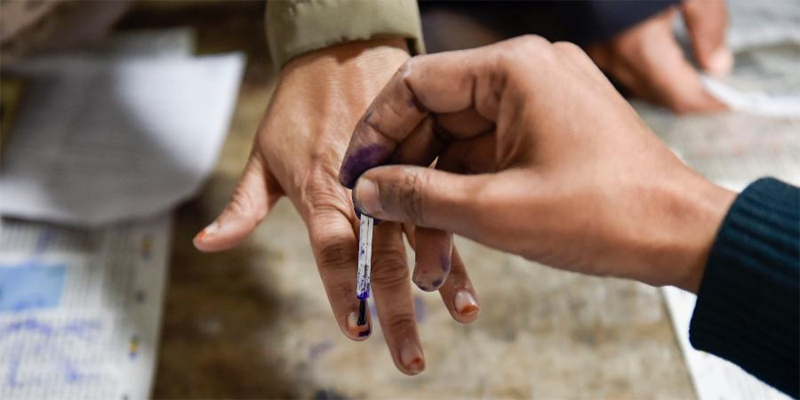Panel writes to all 20 DCs of J&K
Next meeting likely soon, visit after pandemic eases
Sanjeev Pargal
JAMMU, June 8: Stepping up the process for delimitation of Assembly constituencies in Jammu and Kashmir, which is reeling under the Central Rule for last more than three years, the Delimitation Commission today wrote to all 20 Deputy Commissioners of the Union Territory to share data pertaining to electorates etc in their districts as well as the Assembly segments.
The Delimitation Commission headed by Retired Supreme Court Judge Justice Ranjana Prakash Desai, which hasn’t visited Jammu and Kashmir even once since the Commission was constituted on March 6, 2020 for a period of one year, has now shot off letters to all 20 Deputy Commissioners of the Union Territory seeking details on total electorates, topography and other composition of their districts as well as the Assembly constituencies within their jurisdiction at present.
One-year term of the Delimitation Commission had expired in March 2021 and was further extended by another year by the Union Ministry of Law and Justice.
An Election Commissioner and State Election Commissioner (SEC) KK Sharma are two other official members of the Delimitation Commission while five Lok Sabha members from Jammu and Kashmir are it’s Associated Members. They include Union Minister of State in the Prime Minister’s Office (PMO) Dr Jitendra Singh and Jugal Kishore Sharma (both BJP), Dr Farooq Abdullah, Mohammad Akbar Lone and Hasnain Masoodi (all National Conference).
“The Delimitation Commission could call its second meeting with the Associate Members shortly especially after COVID situation is eased further,” sources said. First meeting of the Commission with the Associate Members was held in New Delhi on February 18 which was attended by the two BJP MPs but boycotted by the NC Parliamentarians on the ground that the party has challenged Jammu and Kashmir Reorganization Act in the apex court under which the Delimitation Commission was set up.
However, the National Conference now definitely has second thought over boycott of the Delimitation Commission as a section of the party leadership feels that any further abstention will give BJP the major say as their two MPs from Jammu region will be only Associate Members in the Commission. However, NC president Dr Farooq Abdullah is yet to take final call on whether to associate with the Commission or not.
“Though the Commission hasn’t visited Jammu and Kashmir, the obtaining of data pertaining to electorates in the districts as well as the Assembly segments (which existed in 2014 elections), topography of the districts and the segments and composition of towns and villages besides population of Scheduled Castes and Scheduled Tribes will help the Commission step up the work on delimitation of Assembly constituencies,” sources pointed out.
The Commission has its term till March 2022 but there is no bar on the Panel submitting report in advance if its ready. However, the Commission has to invite claims and objections from the people by putting report in the public domain before final report is issued. Only after delimitation of the Assembly constituencies is finalized that the Government can go for Assembly elections in Jammu and Kashmir.
The Commission has been mandated to delimit the constituencies of the Union Territory in accordance with the provisions of Part V of Jammu and Kashmir Reorganization Act, 2019 and Delimitation Act, 2002.
While splitting Jammu and Kashmir into two Union Territories through the Reorganization Act, the Union Home Ministry had increased Assembly seats of Jammu and Kashmir by seven taking total seats to 114-24 of which are reserved for Pakistan occupied Kashmir (PoK) while election will be held for 90 seats.
Erstwhile State of Jammu and Kashmir had 111 seats including 24 reserved for PoK while elections were held for 87 seats. With creation of Ladakh as Union Territory, four seats of the region were reduced and the Assembly was left with 83 seats. However, with increase of seven seats, J&K UT will have an Assembly of 90 seats. Two Women MLAs will be nominated to the House, which was the position earlier also.
In the previous Assembly, Kashmir had 46 seats, Jammu 37 and Ladakh four.
Delimitation of the Assembly constituencies was last held in 1994-95 during the President’s Rule when seats of the erstwhile State Assembly were raised from 76 to 87. Jammu region’s seats were increased from 32 to 37, Kashmir’s from 42 to 46 and Ladakh’s two to four. However, the delimitation was freezed in 2002 by the then National Conference Government headed by Dr Farooq Abdullah in lines with the decision taken by then Central Government headed by Atal Bihari Vajpayee.
Elections to the Legislative Assembly will be held only after delimitation of Assembly constituencies is completed.
The delimitation of Assembly seats has become necessity as it would be treated as new Assembly altogether with reservation for Scheduled Castes and Scheduled Tribes. The Scheduled Castes enjoyed reservations in the previous State Assembly also where seven constituencies were reserved for them including Chhamb, Domana, RS Pura, Samba, Hiranagar, Chenani and Ramban, all in Jammu region, while STs had been denied political reservations.
“The STs will get political reservations for the first time in the history of Jammu and Kashmir,” sources pointed out.
It may be mentioned here that seats reserved for SCs had to be rotated after every two terms but in the erstwhile J&K State Assembly, four elections were held on the same reserved seats without rotating them. The Delimitation Commission could now reserve seats in different areas for the SCs, they said.


